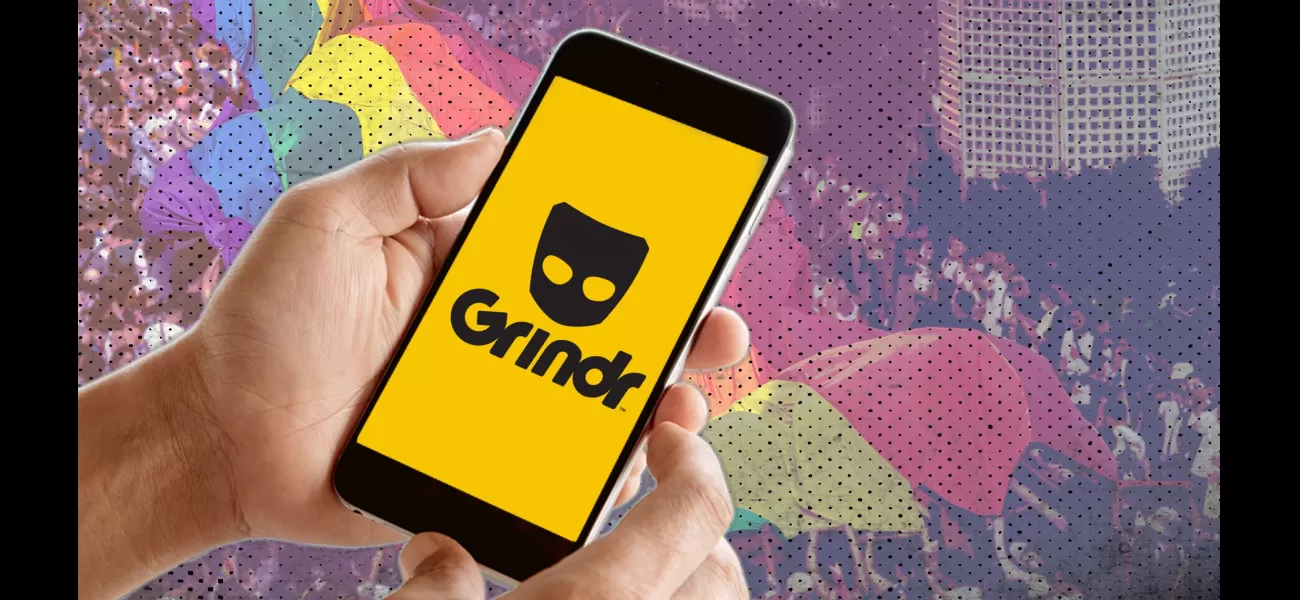Someone is suing Grindr for potentially sharing their HIV status.
I believed in this app... but now it seems like Grindr has broken that trust.
July 13th 2024.

Grindr, the popular dating app for LGBTQ+ people, has faced accusations of sharing user information with third parties for profit. However, the company has denied these claims, saying they have been "mischaracterized."
In 2014, Chris* joined the millions of users who downloaded Grindr and became part of the online community filled with shirtless profile pictures and anonymous profiles. But now, ten years later, Chris is one of 1,500 individuals taking legal action against the app. The claim, filed at London's High Court earlier this year, alleges that Grindr shared users' intimate information, including their name, age, location, physical description, and even their HIV status, with third parties without their consent.
Speaking to The Agency under a pseudonym, as an anonymity order has forbidden claimants from sharing their real names, Chris expresses his disappointment in the app. "How could you treat your users like this?" he asks. "I trusted this app, and it had a huge impact on the gay community. Now, it feels like Grindr has betrayed that trust."
Grindr, which is being advised by law firm Cooley, has denied selling user HIV data and stated that it is "inaccurate" to suggest they shared this information for advertising purposes. As the most popular dating app for LGBTQ+ people, with 13 million monthly users, including 924,000 in the UK, Grindr uses GPS technology to show users potential matches within a 100m radius. The app asks for personal information such as age, height, ethnicity, and even HIV status, and also offers reminders for STI testing and free ads for HIV-testing services.
"Grindr is a vital place for the gay community," explains Chris. "When the app was first released, it completely changed how dating worked. You no longer had to go to gay bars, and seeing who else was in your area was an entirely new experience."
However, according to the class action law firm Austen Hayes, Grindr has breached British data privacy laws by sharing users' personal and sensitive data with third-party advertising companies without their consent. Their lawsuit form, shown to Metro, states that the app used covert tracking technology to collect and share personal data, including highly-sensitive information, with third parties. This move could have potentially profited Grindr.
For many queer individuals, privacy is of utmost importance. Not everyone is open about their sexuality or gender identity, and for some, being out could even put their life at risk. "I'm out, but I know so many gay men who aren't, and I'm worried about them," says Chris.
This issue first came to light in 2018 when Buzzfeed News reported that Grindr was sharing user HIV status with third-party companies, Apptimize and Localytics. Grindr responded by saying they only shared this information with "select trusted contractors." However, in 2020, Norway's consumer protection agency filed a complaint against Grindr for unlawful data mining, and the following year, the Norwegian Data Protection Authority fined the app 65 million Norwegian kroner for violating privacy rights.
According to the European privacy NGO, noyb, which supported the complaints, Grindr had a "take it or leave it" approach to consent and had disclosed users' intimate details with 19 third-party companies. This included MoPub, a mobile advertising platform used by Twitter, which had the right to share information with its 170 partners.
Chris is concerned about the data of users who are not yet open about their sexuality being shared without their knowledge. "Many still don't want to be open about their sexuality, and the idea that their data is now in the hands of complete strangers is extremely worrying."
Grindr maintains that it works with third parties, such as software developers and analytical services, to improve its platform. They also state that any HIV data provided by users and shared with third parties is encrypted, and ads for HIV treatments and other medications are shown to all users, regardless of their medical status.
After the Norwegian case, British data regulators reprimanded the app in 2022 for failing to provide effective and transparent privacy information to UK users. Now, Hanoomanjee, the managing director at Austen Hayes leading the suit, is urging Grindr users to join their claim. To be eligible, individuals must have been on the free version of the app between December 2016 and April 2020.
"All clients in this claim will remain anonymous following a court order, so there should be no fear of their details becoming public or being shared with anyone else," explains Hanoomanjee. "The legal process could potentially take years, so we hope that Grindr decides to behave responsibly and acknowledges their wrongdoing to avoid prolonged court proceedings."
When Chris saw an advert for Austen Hayes' claim on Facebook, he didn't hesitate to join. "The knowledge that my details were passed on to other companies, possibly for profit, made me immediately think about taking legal action," he recalls. Now, he's unsure if he'll ever use or trust Grindr again. "Even though the app is essential, I may have to give it up entirely. It's played a huge role in the community, and it was important to me, but reluctantly, I think I will have to delete it."
In response to these allegations, a spokesperson for Grindr told The Agency that they have never sold or shared user-reported health information, including HIV status, for advertising purposes. They also state that the claims are based on a "fundamental mischaracterization" of practices from over four years ago, and that they remain committed to protecting their users' data and complying with all applicable data privacy regulations. Other companies involved, such as Apptimize and Upland, have been approached for comments.
In 2014, Chris* joined the millions of users who downloaded Grindr and became part of the online community filled with shirtless profile pictures and anonymous profiles. But now, ten years later, Chris is one of 1,500 individuals taking legal action against the app. The claim, filed at London's High Court earlier this year, alleges that Grindr shared users' intimate information, including their name, age, location, physical description, and even their HIV status, with third parties without their consent.
Speaking to The Agency under a pseudonym, as an anonymity order has forbidden claimants from sharing their real names, Chris expresses his disappointment in the app. "How could you treat your users like this?" he asks. "I trusted this app, and it had a huge impact on the gay community. Now, it feels like Grindr has betrayed that trust."
Grindr, which is being advised by law firm Cooley, has denied selling user HIV data and stated that it is "inaccurate" to suggest they shared this information for advertising purposes. As the most popular dating app for LGBTQ+ people, with 13 million monthly users, including 924,000 in the UK, Grindr uses GPS technology to show users potential matches within a 100m radius. The app asks for personal information such as age, height, ethnicity, and even HIV status, and also offers reminders for STI testing and free ads for HIV-testing services.
"Grindr is a vital place for the gay community," explains Chris. "When the app was first released, it completely changed how dating worked. You no longer had to go to gay bars, and seeing who else was in your area was an entirely new experience."
However, according to the class action law firm Austen Hayes, Grindr has breached British data privacy laws by sharing users' personal and sensitive data with third-party advertising companies without their consent. Their lawsuit form, shown to Metro, states that the app used covert tracking technology to collect and share personal data, including highly-sensitive information, with third parties. This move could have potentially profited Grindr.
For many queer individuals, privacy is of utmost importance. Not everyone is open about their sexuality or gender identity, and for some, being out could even put their life at risk. "I'm out, but I know so many gay men who aren't, and I'm worried about them," says Chris.
This issue first came to light in 2018 when Buzzfeed News reported that Grindr was sharing user HIV status with third-party companies, Apptimize and Localytics. Grindr responded by saying they only shared this information with "select trusted contractors." However, in 2020, Norway's consumer protection agency filed a complaint against Grindr for unlawful data mining, and the following year, the Norwegian Data Protection Authority fined the app 65 million Norwegian kroner for violating privacy rights.
According to the European privacy NGO, noyb, which supported the complaints, Grindr had a "take it or leave it" approach to consent and had disclosed users' intimate details with 19 third-party companies. This included MoPub, a mobile advertising platform used by Twitter, which had the right to share information with its 170 partners.
Chris is concerned about the data of users who are not yet open about their sexuality being shared without their knowledge. "Many still don't want to be open about their sexuality, and the idea that their data is now in the hands of complete strangers is extremely worrying."
Grindr maintains that it works with third parties, such as software developers and analytical services, to improve its platform. They also state that any HIV data provided by users and shared with third parties is encrypted, and ads for HIV treatments and other medications are shown to all users, regardless of their medical status.
After the Norwegian case, British data regulators reprimanded the app in 2022 for failing to provide effective and transparent privacy information to UK users. Now, Hanoomanjee, the managing director at Austen Hayes leading the suit, is urging Grindr users to join their claim. To be eligible, individuals must have been on the free version of the app between December 2016 and April 2020.
"All clients in this claim will remain anonymous following a court order, so there should be no fear of their details becoming public or being shared with anyone else," explains Hanoomanjee. "The legal process could potentially take years, so we hope that Grindr decides to behave responsibly and acknowledges their wrongdoing to avoid prolonged court proceedings."
When Chris saw an advert for Austen Hayes' claim on Facebook, he didn't hesitate to join. "The knowledge that my details were passed on to other companies, possibly for profit, made me immediately think about taking legal action," he recalls. Now, he's unsure if he'll ever use or trust Grindr again. "Even though the app is essential, I may have to give it up entirely. It's played a huge role in the community, and it was important to me, but reluctantly, I think I will have to delete it."
In response to these allegations, a spokesperson for Grindr told The Agency that they have never sold or shared user-reported health information, including HIV status, for advertising purposes. They also state that the claims are based on a "fundamental mischaracterization" of practices from over four years ago, and that they remain committed to protecting their users' data and complying with all applicable data privacy regulations. Other companies involved, such as Apptimize and Upland, have been approached for comments.
[This article has been trending online recently and has been generated with AI. Your feed is customized.]
[Generative AI is experimental.]
0
0
Submit Comment





